1. Which No. 1 seed has the toughest road to New Orleans?No one will be surprised if all four No. 1 seeds provide some Final Four déjà vu in a city where it actually seems appropriate to use that term. So difficulty is a relative term when it comes to paths. But the only one of the quartet that doesn't open the tournament playing at home has the trickiest road to travel in the first four rounds. The bracket came out a day late for the luck of the (Fighting) Irish, apparently. 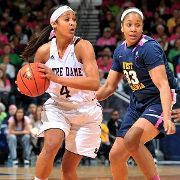 Stanford faces arguably the most difficult single game to get to New Orleans. If the chalk holds and it plays California, with whom it split the regular-season series, there isn't anything in the first three rounds that should concern the Cardinal, other than perhaps preparing for Villanova's unique style on short turnaround in the second round. Bridgeport looks like the deepest regional from top to bottom. But a lot of that is in fact the bottom half of the bracket, where an undervalued Dayton and a Delaware with home-court advantage crowd the picture with North Carolina and a Kentucky team that at various times this season looked like the best of the rest after the top four. But Connecticut has to worry about only one of those teams, and while Maryland would present a Sweet 16 test, there's no reason to think the short-handed Terrapins are better equipped to win in Bridgeport in late March than they were in Hartford in early December. Baylor could be the only top seed to face a team ranked in the top 20 of the RPI in each of the second, third and fourth rounds, but that's more a trick of the numbers than a suggestion that Florida State, Purdue and Tennessee represent any greater grind than Florida, Georgia Tech and Tennessee did in similar roles a season ago. That leaves the toughest road to Notre Dame. The Big East champion was dispatched to Iowa for a potential second-round game against the host school, instead of beginning its journey at a closer neutral site in Columbus, Ohio (albeit closer to South Bend, Ind., by about 20 miles). Deal with Iowa or Miami, and it's off to Norfolk, Va., where the chalk suggests No. 4 seed South Carolina would await as exactly the kind of Sweet 16 team best avoided -- a physical, defense-first team that will wear an opponent out, win or lose. All of which leads to a potential quarterfinal matchup against Duke, the ACC champ playing three hours from its campus and playing perhaps the best basketball of the No. 2 seeds, even after losing All-American point guard Chelsea Gray. Are the Fighting Irish up to the challenge? Skylar Diggins, Kayla McBride, Natalie Achonwa and the rest have given no reason to think otherwise, but the committee did them no favors. 2. Which favored seed has the toughest road trip?It's simultaneously one of the least attractive and most intriguing parts of the women's bracket that higher seeds are forced to play road games in the first and second rounds. It makes a mockery of the integrity of the bracket to have teams on the same seed line playing home, road or neutral games, but the potential for chaos does make for a guilty pleasure. 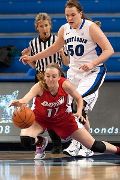 For the most part, the tournament escaped controversy a season ago. Duke, Oklahoma, Penn State and St. John's won second-round road games against lower seeds, as did Delaware and Green Bay in the first round. The lone exception was in Spokane, where host Gonzaga knocked out 6-seed Rutgers and 3-seed Miami to reach the Sweet 16 for the third year in a row. Three higher-seeded teams face first-round road games this time: No. 5 Iowa State at 12-seed Gonzaga, No. 7 Dayton at 10-seed St. John's and No. 8 Miami at 9-seed Iowa. That's a harsh blow for Dayton, which already had reason to gripe about its seed after it entered the process No. 13 in the RPI, No. 18 in the AP Top 25 and 4-1 against tournament teams. Not to mention the Flyers haven't had much luck getting to New York this season. One storm forced them to bus to Siena, while a second storm left them trying for three days to get to New York City to play Fordham. But the real potential for trouble comes in the second round, when No. 1 seed Notre Dame, No. 2 seed California, No. 2 seed Kentucky, No. 3 seed North Carolina, No. 3 seed Penn State, No. 4 seed Georgia, No. 4 seed South Carolina and No. 4 seed Purdue could all find themselves rewarded for those seeds with postseason road games. With the caveat that Gonzaga first has to beat Iowa State to make it an issue, the toughest trip probably belongs to Georgia. That's a tough mix of travel, time zones and Gonzaga's McCarthey Athletic Center, a venue with an atmosphere memorably described by Bulldogs sophomore and German national Sunny Greinacher thusly: "I just never experienced anything even close to that," Greinacher said. "I have to admit, the first couple of games [in the Kennel], I think I almost peed my pants I was so excited -- and a little bit scared, too. It just makes it so much fun." 3. Where is the best place to be for the first two rounds?Gold: College Station, Texas First round: 3-seed Texas A&M vs. 14-seed Wichita State, 6-seed Nebraska vs. 11-seed Chattanooga 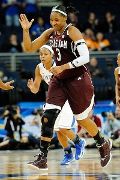 College Station is not the easiest place to get to, but the four-team pod hosted by Texas A&M has everything the discerning fan wants out of the first two rounds. First off, all three games are potentially competitive. Nebraska need only ask Tennessee about No. 11 seed Chattanooga. The Lady Mocs opened the season with a win against the Lady Vols and have enough post offense in Ashlen Dewart and Faith Dupree to give the Huskers trouble. Speaking of Tennessee, former Lady Vol Jody Adams has a veteran, defensive-minded team at Wichita State that could struggle to defend Kelsey Bone but could also make it difficult for the Aggies to get the ball to their star center. If both favorites survive the opening round, we're left with an old Big 12 rematch between current Big Ten and SEC teams. Any court with Bone, Lindsey Moore and Jordan Hooper on it ought to interest fans and WNBA scouts. Silver: Baton Rouge, La. First round: 3-seed Penn State vs. 14-seed Cal Poly, 6-seed LSU vs. 11-seed Green Bay For the second season in a row, Green Bay plays a first-round road game, which makes you wonder if there might be some Chicago Bears fans on the committee. As a result, Baton Rouge is the only site with three teams ranked in the RPI top 25. With apologies to Cal Poly (which at least shouldn't be awed by the competition after games against Oklahoma State and California this season), this site sets up as a playoff to see which defense, LSU's or Green Bay's, gets a chance to try to do what Michigan State's defense did to Penn State in the Big Ten tournament. Either way, you've got a dangerous low seed, home-court advantage and a favorite with something to prove in Baton Rouge. 4. What are five more potential Week 1 upsets? Central Michigan over Oklahoma (first round): Surely the lone neutral site venue in the opening round is a good place to look for a potential upset. The Chippewas gave Notre Dame a game early in the season, down just one point at halftime and four points with two minutes to play, and also beat Green Bay, Saint Joseph's, South Dakota State and Toledo (twice). Led by Crystal Bradford, they're a good rebounding team for a mid-major, which could put pressure on an Oklahoma team that ranked seventh among Big 12 teams in rebound margin. 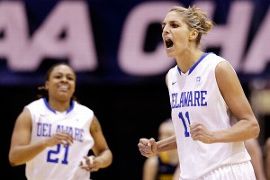 Dayton over Kentucky (second round): It doesn't show up on the schedule, but these two teams played this season -- a closed-door scrimmage before either opened its regular schedule. Any scorekeeping seems to be lost to history or secrecy, but Dayton players talked about the confidence they drew from that experience. The teams share a desire to push tempo and have athletic, versatile posts, so at the very least, this one would be fun to watch. Delaware over North Carolina (second round): Sylvia Hatchell was one of the first coaches to send Elena Delle Donne a recruiting letter, so she won't need any refresher on the caliber of player her team must defend on Delle Donne's home court. The Tar Heels are bigger than the Blue Hens, but they also weren't the same on the road (8-4 away from Chapel Hill and 17-1 at home), aren't a consistent 3-point shooting team and must force turnovers against a team that doesn't turn the ball over very much. South Dakota State over South Carolina (first round): This game in Boulder, Colo., has a chance to be the most physical of the first round. Both teams defend well and aggressively (South Dakota State held Nebraska and Middle Tennessee State in the 50s in wins and Penn State to 60 in a loss), both teams rebound better than they should at their size and can be streaky shooting the ball. Texas Tech over California (second round): Some of us have Cal going all the way to New Orleans, but we can't just skip past the fact that Lubbock, Texas, is a really tricky trip to take for a roster that has just one NCAA tournament win to its credit (last season against Iowa). The Red Raiders are 14-3 at home this season, including wins against Kansas, Oklahoma State and West Virginia. They forced more than 20 turnovers per game at home this season. 5. Who are five players to catch while you can? Angel Goodrich, Kansas: Presumably the last team in the field, given its seeding, 12th-seeded Kansas gets at least one more opportunity to hand the ball to the nation's active assists leader. And considering the Jayhawks reached the Sweet 16 a season ago as a No. 11 seed, perhaps the run will last beyond the first week for a premier point guard. 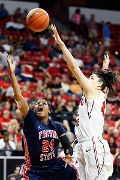 Julie Forster, Albany: You shouldn't need many guesses to get the leading active rebounder in the NCAA tournament (she does confetti angels after national championships), but No. 3 on that list would stump most people. Originally a walk-on at Albany, Forster is a three-time member of the America East all-defensive team. Small wonder the Great Danes face No. 3 seed North Carolina, ranked third in the NCAA in scoring defense and fifth in field goal defense. Kevi Luper, Oral Roberts: That Luper's scoring average "dipped" to 19 points a game this season says plenty about a career that leaves her behind only Brittney Griner and Delle Donne among active leading scorers. She was on pace to rank along the all-time top 10 scorers until this season, but it's safe to assume that wouldn't have been nearly as sweet a reward as her first trip to the NCAA tournament and a game against No. 2 seed Tennessee at Thompson-Boling Arena, one of the sport's special venues. Ki-Ki Moore, Fresno State: Moore's body couldn't take another season of basketball, but she earned one more game. The fourth-year junior who transferred from Washington State announced before the Mountain West tournament that she would not use her final season of eligibility as a result of persistent pain. Then she went out and scored 61 points in three days, including a winning shot in the semifinals, to earn the Bulldogs a place opposite 2-seed California in Lubbock. Niveen Rasheed, Princeton: The draw wasn't kind to one of the best players in Ivy League history, who will finish her career in Waco, Texas, but needs a win against No. 8 Florida State to even earn a shot at No. 1 Baylor. But she won't be out of place sharing an arena with Griner, Odyssey Sims and the defending champions. An athletic, do-everything forward, she lost a season to knee injury midway through her time in New Jersey but lost just one Ivy League game in her four seasons.
|
